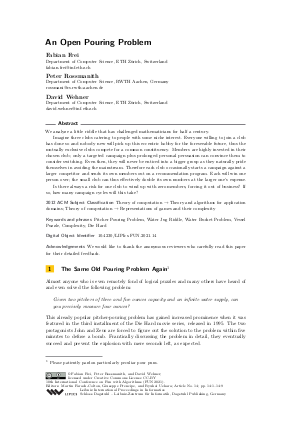An Open Pouring Problem
Authors Fabian Frei, Peter Rossmanith, David Wehner
-
Part of:
Volume:
10th International Conference on Fun with Algorithms (FUN 2021)
Part of: Series: Leibniz International Proceedings in Informatics (LIPIcs)
Part of: Conference: International Conference on Fun with Algorithms (FUN) - License:
 Creative Commons Attribution 3.0 Unported license
Creative Commons Attribution 3.0 Unported license
- Publication Date: 2020-09-16
File

PDF
LIPIcs.FUN.2021.14.pdf
- Filesize: 2.5 MB
- 9 pages
Document Identifiers
Subject Classification
ACM Subject Classification
- Theory of computation → Theory and algorithms for application domains
- Theory of computation → Representations of games and their complexity
Keywords
- Pitcher Pouring Problem
- Water Jug Riddle
- Water Bucket Problem
- Vessel Puzzle
- Complexity
- Die Hard
Metrics
- Access Statistics
-
Total Accesses (updated on a weekly basis)
0Document
0Metadata
Abstract
We analyze a little riddle that has challenged mathematicians for half a century. Imagine three clubs catering to people with some niche interest. Everyone willing to join a club has done so and nobody new will pick up this eccentric hobby for the foreseeable future, thus the mutually exclusive clubs compete for a common constituency. Members are highly invested in their chosen club; only a targeted campaign plus prolonged personal persuasion can convince them to consider switching. Even then, they will never be enticed into a bigger group as they naturally pride themselves in avoiding the mainstream. Therefore each club occasionally starts a campaign against a larger competitor and sends its own members out on a recommendation program. Each will win one person over; the small club can thus effectively double its own numbers at the larger one’s expense. Is there always a risk for one club to wind up with zero members, forcing it out of business? If so, how many campaign cycles will this take?
Cite As Get BibTex
Fabian Frei, Peter Rossmanith, and David Wehner. An Open Pouring Problem. In 10th International Conference on Fun with Algorithms (FUN 2021). Leibniz International Proceedings in Informatics (LIPIcs), Volume 157, pp. 14:1-14:9, Schloss Dagstuhl – Leibniz-Zentrum für Informatik (2020)
https://doi.org/10.4230/LIPIcs.FUN.2021.14
BibTex
@InProceedings{frei_et_al:LIPIcs.FUN.2021.14,
author = {Frei, Fabian and Rossmanith, Peter and Wehner, David},
title = {{An Open Pouring Problem}},
booktitle = {10th International Conference on Fun with Algorithms (FUN 2021)},
pages = {14:1--14:9},
series = {Leibniz International Proceedings in Informatics (LIPIcs)},
ISBN = {978-3-95977-145-0},
ISSN = {1868-8969},
year = {2020},
volume = {157},
editor = {Farach-Colton, Martin and Prencipe, Giuseppe and Uehara, Ryuhei},
publisher = {Schloss Dagstuhl -- Leibniz-Zentrum f{\"u}r Informatik},
address = {Dagstuhl, Germany},
URL = {https://drops.dagstuhl.de/entities/document/10.4230/LIPIcs.FUN.2021.14},
URN = {urn:nbn:de:0030-drops-127751},
doi = {10.4230/LIPIcs.FUN.2021.14},
annote = {Keywords: Pitcher Pouring Problem, Water Jug Riddle, Water Bucket Problem, Vessel Puzzle, Complexity, Die Hard}
}
Author Details
Acknowledgements
We would like to thank the anonymous reviewers who carefully read this paper for their detailed feedback.
References
- URL: https://kskedlaya.org/putnam-archive/1993.pdf.
- URL: https://www.research.ibm.com/haifa/ponderthis/challenges/May2015.html.
- URL: https://bwinf.de/fileadmin/bundeswettbewerb/38/BwInf38-Aufgabenblatt.pdf.
- URL: https://oeis.org/A256001.
-
Paolo Boldi, Massimo Santini, and Sebastiano Vigna. Measuring with jugs. Theor. Comput. Sci., 282(2):259-270, 2002.

-
Yiu-Kwong Man. A non-heuristic approach to the general two water jugs problem. Theor. Comput. Sci., (10):904-908, 2013.

-
Николай Борисович Васильев (Nikolaj Borisovich Vasil'ev) and Александр Александрович Егоров (Aleksandr Aleksandrovich Egorov). Задачи всесоюзных математических олимпиад (Zadachi Vsesojuznyh Matematicheskih Olimpiad, Problems of the All-Union Mathematical Olympiads). Наука (Nauka), 1988.

-
Glânffrwd P. Thomas. The water jugs problem: Solutions from artificial intelligence and mathematical viewpoints. Mathematics in School, 24(5):34-37, 1995.

-
Peter Winkler. Mathematical Puzzles: A Connoisseur’s Collection. A K Peters, 2004.

-
Peter Winkler. Five algorithmic puzzles. In Tribute to a Mathemagician, pages 109-118. A K Peters, 2005.

-
Peter Winkler. Mathematische Rätsel für Liebhaber. Springer, 2008.

